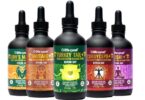Today, many people understand that wellness and nutrition must take center stage. Health supplements have become increasingly popular. Health supplements encompass diverse products, from vitamins and minerals to herbal extracts and protein powders, designed to augment and support wellness and nutrition.
The question is whether one truly needs these supplements.
While some individuals may benefit from specific supplements to address deficiencies or enhance performance, others may find their nutritional requirements adequately met through a balanced diet alone. Besides dietary supplements, other lifestyle changes, such as therapeutic yoga training, are also gaining popularity for their benefits.
Understanding Dietary Supplements
Dietary supplements are intended to fill nutrient gaps in our diet and nutrition, not magically fix deficiencies. Before popping pills, we need to remember:
- Food First: A balanced, diverse diet should be the primary source of nutrients. Supplements are merely “add-ons.”
- Quality Matters: Choose reputable brands and prioritize third-party lab certifications for purity and potency.
- Doctor’s Advice: Discuss your needs with a healthcare professional to identify potential interactions with medications or underlying conditions.
- Understand Dosage: Don’t fall for the “more is better” trap. Follow recommended dosages on labels and avoid exceeding them unless guided by a medical professional. Excessive intake can lead to toxicity or interfere with your wellness and nutrition balance.
- Take Tests: While essential nutrients like Vitamin D3 and B12 may be commonly targeted, individual needs vary. Consider personalized blood tests or consultations with a registered dietitian to identify specific nutrient gaps and tailor your supplement choices accordingly.
Who Needs a Boost?
While a healthy diet may suffice for some, certain groups may benefit from targeted supplementation and added wellness and nutrition:
- People with nutrient deficiencies: Dietary restrictions, certain medications, or medical conditions can lead to nutritional gaps. Targeting specific deficiencies can be helpful.
- Older adults: Absorption of nutrients like B12 declines with age, making supplementation valuable.
- Pregnant and breastfeeding women: Increased needs for specific nutrients like folic acid and iron might necessitate supplementation.
Essential Supplements to Include in our Diet
Now, let’s peek into the world of specific supplements that can play a supportive role in your wellness journey:
- Vitamin D3: The “sunshine vitamin” is crucial for bone health, immune function, and mood regulation. Consider a supplement, especially if sun exposure is limited.
- Vitamin C: This antioxidant powerhouse supports immunity and collagen production. Supplementing can be beneficial for smokers or those with low dietary intake.
- Calcium: Building and maintaining strong bones is its forte. Supplementation might be helpful for postmenopausal women, people with lactose intolerance, or those lacking dietary sources.
- B12: Vital for nerve function and red blood cell production, B12 deficiency is common in vegetarians and older adults. Supplementation can be crucial for these groups.
- Zinc: This mineral plays a role in immunity, wound healing, and enzyme function. Consider supplementation if you have frequent infections or if dietary sources are limited.
- Omega Fatty Acids: These healthy fats, primarily found in oily fish, support brain health, heart health, and inflammation reduction. Supplementation with fish oil or plant-based alternatives like algae oil can be beneficial.
Other Lifestyle Changes for Overall Holistic Health Benefits
Remember, supplements are just one piece of the well-being puzzle. Let’s explore some powerful lifestyle changes that can truly unlock your health potential:
- Therapeutic Yoga Training: Regular yoga practice, mainly focusing on therapeutic techniques, can enhance flexibility, reduce pain, and improve mental well-being.
- Sugar Savvy: Kicking the sugar habit is a game-changer. Excessive sugar intake contributes to inflammation, weight gain, and chronic diseases. Opt for natural sweeteners and prioritize whole foods for sustained energy.
- Sleep Sanctuary: Prioritizing 7-9 hours of quality sleep is non-negotiable. Sleep deprivation disrupts hormones, weakens immunity, and impacts cognitive function. Create a relaxing bedtime routine and prioritize sufficient sleep.
- Moderate Cheers: Enjoying alcohol in moderation, if at all, can be part of a healthy lifestyle. However, excessive alcohol consumption takes a toll on your liver, brain, and overall health. Be mindful of your intake and prioritize non-alcoholic alternatives.
A Symphony of Wellness
Navigating the realm of supplements and holistic habits requires personalized attention and mindful choices. Remember, there’s no one-size-fits-all approach. Consult your doctor, prioritize a balanced diet, and experiment with complementary supplements if needed. Embrace therapeutic yoga training, ditch the sugar addiction, prioritize sleep, and find a healthy balance with alcohol.
So, embark on your wellness journey with an open mind, informed choices, and a commitment to holistic practices. Your body and mind will thank you for it.
Photo by Nataliya Vaitkevich








